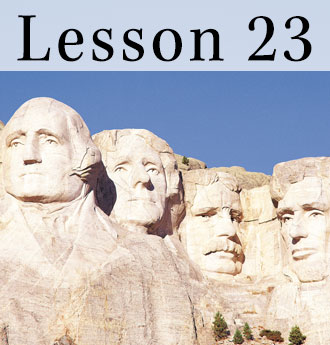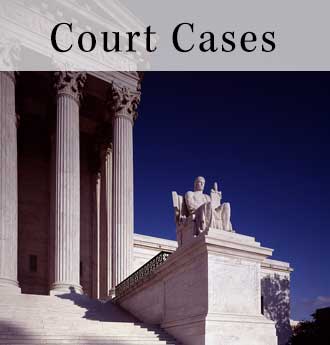Lesson 23: What Is the Role of the President in the American Constitutional System?
Jefferson, Thomas (1743-1826) Thomas Jefferson was the third president of the United States. He was a scientist, philosopher, diplomat, and architect. He supported the revolutionary cause and served as governor of Virginia. Between June 11 and June 28, 1776, Jefferson wrote the initial draft of the Declaration of Independence, which was amended by John Adams and Benjamin Franklin and submitted to Congress. Jefferson supported the Constitution but was critical of its lack of a bill of rights. He was the first secretary of state in Washington's cabinet and the leader of the Republican Party. Jefferson was elected vice president in 1796 and was chosen president four years later. He was reelected to the presidency in 1804.
Johnson, Lyndon B. (1908-1973) Thirty-sixth president of the United States. Served in both the House and the Senate. Elected in 1955 as Senate Majority Leader. Elected vice president in 1960. Succeeded to presidency in 1963 upon the assassination of President Kennedy. Elected president in 1964.His "Great Society" program included massive grants to cities and metropolitan areas and programs to assist the poor and minorities. More grant programs came into existence during the five years of Johnson's administration than any other time in American history.
Kennedy, John F. (1917-1963) Thirty-fifth president of the United States. Elected to the House of Representatives in 1946; six years later, was elected to the Senate. In 1960, Kennedy became the youngest man and first Catholic ever elected president. Assassinated in 1963.
Lincoln, Abraham (1809-1865) Lincoln was the sixteenth president of the United States. In his Gettysburg Address he declared the aim of preserving a "nation conceived in liberty and dedicated to the proposition that all men are created equal."
Roosevelt, Franklin D. (1882-1945) Thirty-second president of the United States, the only person to be elected to the office four times. He served during the Great Depression of the 1930s and World War II.
Roosevelt, Theodore (1858-1919) The twenty-sixth president of the United States, Roosevelt was an immensely popular leader who wrote on American ideals, ranching, hunting, and zoology. He won the Nobel Peace Prize in 1906 for his part in ending the Russo-Japanese War by orchestrating meetings that led to the Treaty of Portsmouth in 1905.
Truman, Harry (1884-1972) Thirty-third president of the United States. Elected to the Senate from Missouri in 1934. Chosen as Franklin Roosevelt's running mate in 1944, he succeeded to the presidency upon Roosevelt's death in April 1945, and was reelected in 1948. He was responsible for integrating the Armed Forces.
Washington, George (1732-1799) George Washington was born in Virginia in 1732. He grew up there on several plantations along the Potomac and Rappahannock Rivers. He was not particularly well educated, but did learn surveying. In 1753, he began his service to the country, which was to continue throughout his life, despite his desire to live a more private existence. Washington's efforts as commander of the Continental Army are well known. After the Treaty of Paris was signed in 1783, Washington returned to his home, Mount Vernon. Although he did not initially want to attend the Philadelphia Convention, his friends convinced him that his presence was necessary. He was elected president of the convention but spoke little. His presence and approval, however, were important. Nearly everyone assumed that Washington would be the first president of the United States, which, of course, he was, serving from 1789-1797.








